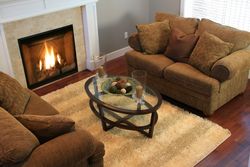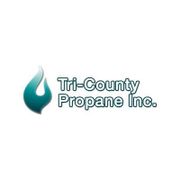
A propane fireplace is an excellent addition to any home to keep out the cold, enhance comfort levels, and make your home more energy-efficient this winter. All that’s needed to enjoy a roaring fire is the flip of a switch, and the environmentally-friendly fuel is readily available and easy to use. Before installing a gas fireplace in your home, consider the following common questions to learn more about them.
What You Should Know About Propane Fireplaces
Are gas fireplaces safe?
Gas fireplaces are among the safest available. When you’ve finished enjoying your fire, you can switch the fireplace off, and the heat will be immediately extinguished, with no lingering embers or hot ash. Unlike wood fireplaces, gas won’t emit fine particles, which can irritate those with allergies, asthma, or respiratory conditions. The primary safety concern of gas-burning fireplaces is carbon monoxide, which can be readily avoided by scheduling annual safety inspections.
What are the advantages of propane fireplaces?
 One of propane’s greatest benefits is its efficiency, offering nearly four times as much energy as wood fuels. One tank of gas can burn longer and more cleanly than wood, keeping fuel expenses lower throughout the winter. Furthermore, a gas fireplace can be fitted with an IPI (Intermittent Pilot Ignition) system, which will keep a pilot light constantly lit for easy ignition. Since more than half of the fuel reserved for use in ignition can be consumed in a cold start, this can help keep consumption and fuel costs low.
One of propane’s greatest benefits is its efficiency, offering nearly four times as much energy as wood fuels. One tank of gas can burn longer and more cleanly than wood, keeping fuel expenses lower throughout the winter. Furthermore, a gas fireplace can be fitted with an IPI (Intermittent Pilot Ignition) system, which will keep a pilot light constantly lit for easy ignition. Since more than half of the fuel reserved for use in ignition can be consumed in a cold start, this can help keep consumption and fuel costs low.
What maintenance is required?
Before each heating season begins, any dust or debris should be cleared from the fireplace vent, blower, and logs. Dust can cause unpleasant burning smells or damage sensors, while twigs and leaves in the vent can cause carbon monoxide to leak into your home or start a fire. An annual inspection is necessary to identify any leaks, glass cracks, or other issues.
Is a chimney necessary?
Propane fireplaces are available in unvented and vented configurations, but neither requires a traditional chimney. Vented systems connect to a vent that channels emissions outside, similar to a drier or extractor vent. Unvented fireplaces are contained within a glass enclosure, where any gas released will be safely and efficiently burned away as heat for your home.
If you’re ready to furnish your home with efficient, reliable, and affordable heat this winter, turn to Tri-County Propane Inc. in Loveland, OH. This trusted local company offers a wide range of services for gas fireplaces, including parts, accessories, cylinder refilling, repairs, and more. To discuss your heating needs with a knowledgeable team member, call (513) 583-1868 or visit them online to learn more about their services.
About the Business
Have a question? Ask the experts!
Send your question

